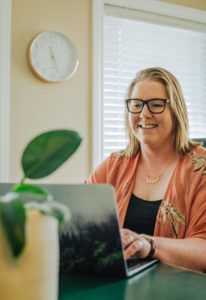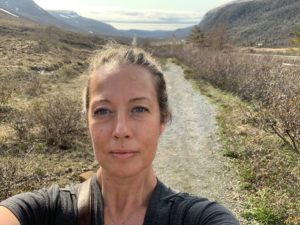No matter the role within rural health care, continuing education is important.

That’s why RhPAP offers a variety of programs that support continuous learning, including opportunities like the Rural Education and Advanced Learning Program .
Introduced in 2020, the purpose of REAL is to improve the accessibility of educational opportunities for rural nurses, midwives, nurse practitioners, and other allied health professionals.
Focusing on rural providers in primary care networks, out-of-scope/non-union positions, or independent/private practices, the program offers support to those who often find it harder to access grants and professional development funding.
Out-of-scope professionals are in luck with REAL opportunities
A registered nurse since 1994, Kristine Smith, said she had always been interested in a master’s degree in Nursing. She explained that costs and time commitment had always deterred her from pursuing her educational goal, until last year when the “stars aligned.”
“I’ve … talked myself out of taking a master’s program [several] times, but I came across the website again and was looking at it just thinking, ‘I should do it,’” explained Smith, who works in the east-central Alberta community of Coronation.
“I didn’t have enough time to talk myself out of it, so I just applied. Within a couple of days, I [learned about] RhPAP’s REAL funding and that’s kind of when you know that it’s all meant to be.”
According to Smith, there isn’t a lot of education support for out-of-scope health professionals.
“In scope, they have opportunities to receive funding through unions and things like that but, for out-of-scope like managers and practice leads, there aren’t funding opportunities,” explained the rural emergency practice lead for central zone Alberta Health Services
Thanks to support received through the REAL Program, Smith is now enrolled in the three-year Master of Nursing: Course-based (MNCB) Program at the University of Calgary. Described by Smith as “tailored for professionals,” the program represents an increasing trend that makes it easier for rural practitioners to access educational opportunities.
“I’ve looked for quite some time to find a master’s program, that 1) interested me, 2) fit my lifestyle with working full-time, and 3) I could do virtually,” she shared. “The program I’m taking, is a ladder certificate program [that’s] really tailored to professionals who are working full-time. The course load is really quite manageable and it’s all meant to be taken virtually, and living rurally that was very important to me.”
REAL allows rural social worker to better address clients’ needs
Since the pandemic began in early 2020, the number of online courses available to health professionals has increased substantially.
“I hate saying there’s been a perk to COVID, but so [many] more programs are available online [now],” shared Jamie Knight, a registered social worker and owner of Good Life Collective, a private mental health practice located in Wainwright.
“Previously, it [could be] tricky. If you have to go to the city every time to engage in the latest training, that adds a whole ton of expenses, logistics, and all of those pieces.”
REAL funding can be used to cover course or training fees, accommodations, mileage/travel expenses, and course books/material costs for both in-person and online programming.
“If I had to pay for [the program] myself, I [probably] would have been trying to fit clients in between [sessions],” said Knight, explaining that the program she took covered 32 hours-worth of material over five days.
“[The program] was pretty intensive,” she said, explaining that REAL support allowed her to take a week off from work for the End of Life Doula training through Douglas College, based in British Columbia. “It was pretty draining days, with a lot of heavy material.”
“In social work, especially working as a mental health clinician, you deal so much with grief and anticipatory grief. You see a lot of people dealing with the fallout after somebody’s death, whether it was something that happened very slowly or whether it was sudden,” shared Knight.
“We (society) kind of build-up the anticipation to it (death), but we’re not sure how to deal with it or what to do next. This course offered a lot of context, resources, and understanding on my part to be able to help people in that situation.”
Helping rural first responders deal with compassion fatigue

Having learned about REAL through a friend, Sharon Mailloux said she originally looked into the program to see if it could help her achieve one of her many ambitions, including creating a workshop/seminar for first responders on compassion fatigue.
“I know COVID took its toll on everyone, but this population especially felt the demands of it,” expressed Mailloux. “I believe that many are fatigued, tired of caring, and then feeling distressed that they feel that way. I want to help them restart their hearts and feel more like themselves, and more like the wonderful and caring professionals they are.”
“I wanted to see if [REAL] was a viable avenue to support me in doing that,” explained the registered psychologist, and owner of Indigo Counselling and Consulting in Whitecourt. “
Using REAL funding, Mailloux was able to take the Compassion Fatigue Educator Training online through Green Cross.
“Our field is ever-changing—there’s new knowledge, new studies coming out, and new practices being developed… [Ongoing training] helps to ensure that we are delivering the most relevant and effective services to our clients.”
Education opportunities don’t just stop with upgrading skills.
According to Mailloux, they can also open the door for rural practitioners to network with colleagues and create a sense of community despite living in remote locations.
“It’s important to share spaces, ideas, info, and words of encouragement with other people who do the same or similar work as you.”
To learn more about REAL, including upcoming deadlines, eligibility, or examples of program possibilities, visit www.rhpap.ca/real, email REAL@rhpap.ca, or call (780) 423-9911.
— Lesley Allan
